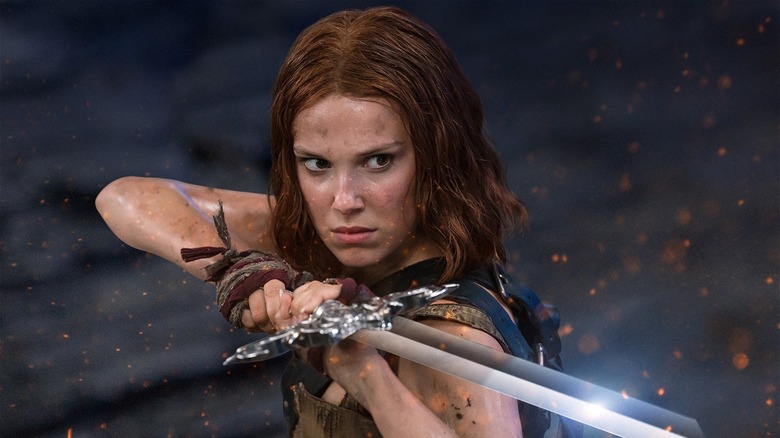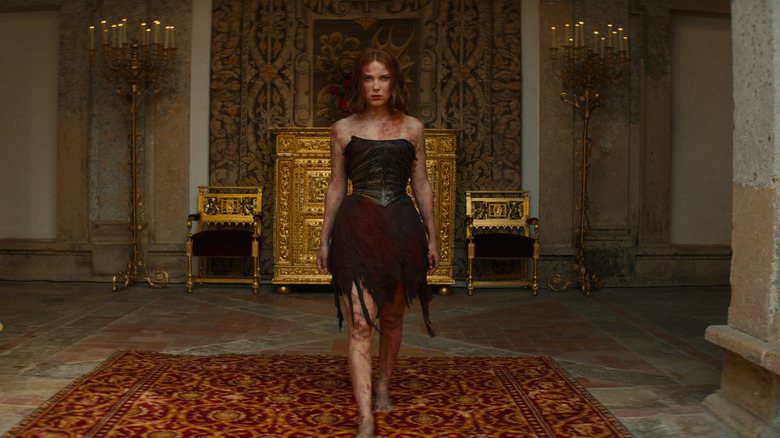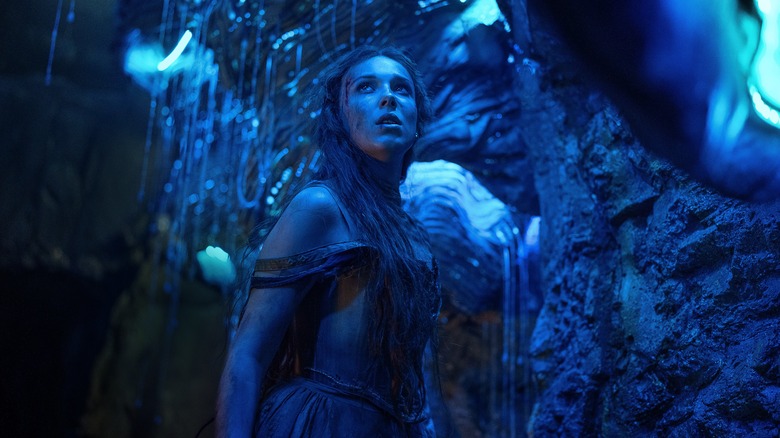Damsel Review: A Deeply Flawed Feminist Fairy Tale
- Concept is appealing
- Angela Bassett is the MVP
- Poor performances
- Weak narrative structure
- Uninspiring CGI
In Netflix's latest attempt at a feminist fairy tale, "Damsel" ends up serving as a sort of a mashup of "Ready or Not" and "The Paper Bag Princess" — although, it has to be said, nowhere near as good as either. Millie Bobby Brown has had success as a Netflix starlet in the past, with both "Stranger Things" and "Enola Holmes" making a positive impression on audiences, but she doesn't fare nearly as well in "Damsel." The script is kind of hacky, there's absolutely zero subtlety to any of the storytelling, and although Brown brings a sense of youthful defiance to the lead role, her limitations as an actress are on full display.
Elodie (Millie Bobby Brown) is the strong one in her family (we know this because, during her introductory scene, we see her chopping wood). They are well-born, but from a land in the North that has long been struggling with financial difficulties, a hardship Elodie is determined to alleviate for her people. It turns out that, in the long tradition of aristocracy, the best way for a first-born daughter to fix her family's problems is to marry well. Enter the king and queen of a foreign land, who are looking for a woman to marry their handsome young prince. It's an offer that almost seems too good to be true: In return for Elodie's hand in marriage, her new in-laws will provide Elodie's father and stepmother with a much-needed injection of cash into their local economy. And Elodie, the daughter of provincial nobility, will be queen one day. She is being offered a true fairy tale ending. But the cynical among us might ask, "What's the catch?"
Well, the catch is that immediately after being married to Prince Henry (Nick Robinson), she'll be immediately tossed into the dragon's lair, where she'll be feasted on as part of a ceremonial act of retribution; a relic from a long-ago conflict between the royal family and the dragon that both sides seem to remember slightly differently. But what Prince Henry and his over-bearing mother Queen Isabelle (Robin Wright) aren't counting on is that Elodie's Not Like Other Girls — she has the pluck and gumption to fight the dragon, hoping desperately to end the cycle of violence against generations of women.
Subtlety, thy name is not Damsel
"Damsel" does its stock and trade in this kind of female empowerment, a theme that is extremely on the nose throughout the entire film. We see very clearly how marriage, historically, is represented as being akin to human sacrifice, where a helpless young woman is subject to the whims of her new family. Every single character is built out of cardboard, mere props in a storybook fiction, and only Angela Bassett (surprise, surprise) as Elodie's stepmother manages to make something of her role. In a diversion from the traditional wicked stepmother stock character, she cares deeply for Elodie and her younger sister and is the only person who senses something awry about the royal family. More importantly, despite the fact that this marriage would save their family, she leaves the door open for Elodie to back out of the arrangement in an empathetic gesture that feels the most human out of anything in "Damsel."
Misogyny and classism are the words of the day. The peril of women is clearly shown, as is the tendency of the rich to exploit and ultimately sacrifice the poor to achieve their own ends. Interestingly (and this is perhaps the only interesting choice that the film makes), the misogynist sacrifice of royal brides is something perpetuated almost entirely by women. Queen Isabelle spearheads the grisly practice, maneuvering her husband — who barely speaks throughout the entire film — and her clearly guilt-ridden son through the ceremony. The dragon herself is female, taking out her grief and rage on innocent young women over the course of several generations. (The fact that it was a man, the former ruler of the kingdom, who caused all this mess in the first place, does not go amiss.)
The weaknesses of Damsel
There is potential within the narrative of "Damsel," but it's let down by stylistic choices and inherent weaknesses in the screenplay. The visuals are dominated by CGI, which makes the film feel as though all of its landscapes were generated by a wonky AI. There aren't enough engaging set pieces within the caves themselves, and the story has a tendency to become increasingly repetitive as it carries on. No sooner does Elodie escape the cave than the plot conveniently forces her back in again.
Based on its logline, "Damsel" seems like it should be a lot of fun. Who doesn't want to watch a beleaguered princess flip the script and finally get some agency over her own life? But unfortunately, "Damsel" misses the mark on so many levels that it's difficult to count them all. Between bad acting, an uninspiring narrative, and forgettable visuals, "Damsel" seems destined to become just another anonymous addition to Netflix's slate, disappearing into the streaming depths almost immediately upon arrival.
"Damsel" premieres on Netflix on March 8.


